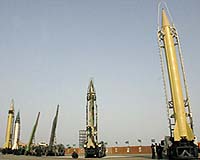 Swords and Shields: Iran's missile allies
(NSI News Source Info) October 6, 2008: It is expected that the Shahab 4 and Shahab 5 would have, in addition to inertial navigation systems, advanced navigation technology, possibly sold by Russia, which could be competing with China in the lucrative Iranian ballistic missile market.
Swords and Shields: Iran's missile allies
(NSI News Source Info) October 6, 2008: It is expected that the Shahab 4 and Shahab 5 would have, in addition to inertial navigation systems, advanced navigation technology, possibly sold by Russia, which could be competing with China in the lucrative Iranian ballistic missile market.
Attempts to thwart Iran's missile ambitions are hampered by the fact that Tehran is being backed by Russia and China. These powers are actually partners in the Iranian ballistic missile and space programs, which they view as both geopolitically desirable -- to dilute U.S. influence -- and lucrative.
It is likely that Iran's Explorer-1 rocket is the result of the country's advanced ballistic missile program.
The greater the range and payload capacity, the more capable is a missile to serve as a civilian SLV (satellite launch vehicle). Thus, the launching of the Iranian rocket could mark a threshold in Tehran's development of longer-range ballistic missiles.
And it is highly unlikely that, without plans to deploy nuclear warheads on its ballistic missiles, the Islamic Republic of Iran would be developing civilian space launch capability when commercial space launch services are readily and cheaply available from French Guyana to Russia to India and China.
It is expected that the Shahab 4 and Shahab 5 would have, in addition to inertial navigation systems, advanced navigation technology, possibly sold by Russia, which could be competing with China in the lucrative Iranian ballistic missile market.
The navigation systems of these missiles would have the Russian Glonass satellite navigation capability, Moscow's answer to the U.S.-developed Global Positioning System, or GPS. The GLONASS system is expected to have global reach with 24 satellites in orbit by the end of 2009, and to provide by 2011 a level of accuracy to civilians of 1 meter. The GLONASS system will be compatible with the U.S. GPS and Europe's future Magellan systems.
Russia's Topol-M ICBM has a guidance system featuring inertial navigation compatible with GLONASS. Eventually, the Iranian ballistic missiles would be capable of being armed with nuclear, chemical, high explosive -- HE -- and conventional warheads, and possibly special warheads as in some Russian ballistic missiles like electro-magnetic pulse -- EMP -- and anti-radiation against radars.
Russian, Chinese and North Korean cooperation would be desirable and necessary to stop Iran's missile program, albeit today it is politically inconceivable, due to U.S.-Russian tensions over Georgia and North Korean efforts to restart its nuclear program.
Although China is not a member of the Wassenaar Arrangement, which limits the spread of advanced weapons technology (the successor of CoCom -- the Coordinating Committee for Multilateral Export Controls) and the Missile Technology Control Regime, Russia is. Pressure should be exerted on Moscow to abide by these control regimes.
China should be invited once again to become a member of these regimes, and should be persuaded to act as a responsible power and thus work as part of the international community to help stop the exports of its own and North Korean missile technology, and to exert pressure on Iran to halt its growing missile program.
Beyond that, only deployment of missile defense systems in the Middle East and Europe, and Iran's fear of nuclear retaliation, may prevent Tehran from deploying nuclear-tipped intermediate-range ballistic missiles -- IRBMs -- and intercontinental ballistic missiles -- ICBMs -- in the future. The Cold War experiences of the 20th century -- or worse -- may revisit the Middle East, Europe and the United States in the years to come.
No comments:
Post a Comment